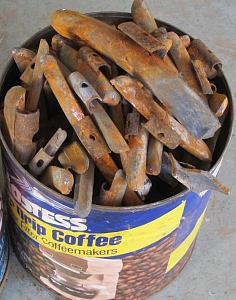I scored several hundred pounds of lead in 15 coffee cans a couple of months ago from one guy, and over 100# of diver's weights of unknown alloy from another guy.
I spent part of yesterday and all of today in the shade of our back patio sorting the coffee cans full of wheel weights and other kinds of lead. After removing the steel and zinc weights, breaking the old-school long lead weights into 2 or 3 pieces, and sorting out the Stick on Weights, lead pipe, and even some copper that was buried in one of those cans, I ended up with eight full coffee cans of lead weights (fuller than before), plus two more cans full of very rusty lead weights, a pile of the very large weights that were used for trucks--all told, 300-400# of wheel weight lead. There is also a can full of SOWWs that weighs 20#. That will make some great bullets for a black powder pistol I just got on sale.
I have blisters on both hands from using dykes to pinch a corner of each weight, but I won't notice. I always have some kind of cuts or something on my hands from working with my hands. I just wanted to get the sorting done so that I can melt them down when I get a chance. The first can I went through was disheartening in that there were probably 1/3 steel weights and maybe half that in zinc, although they were mostly clearly stamped Fe or Zn. That must have been the most recent can the guy collected and didn't know that they come in steel or zinc now, because all the rest had only one or two steel or zinc weights among all the other cans. The vast majority were from years ago. Many were the very long weights you don't see anymore.
I had planned to actually start doing some melting this weekend, but I didn't get to it. It took longer to sort the weights than I'd planned.
First question--the very rusty weights--is it worth it to try to clean them up, maybe wire wheel on a drill or even scrub in water, or just throw them in the melt pot as-is and scrape off the rust when they melt? There are two cans full like this.

There were some metal blobs in the mix. They ring like a hard lead alloy, but I can cut off a piece with dykes fairly easily. Do these look like zinc/lead oatmeal?
These things--some kind of plumbing gasket? Old-School Pipe seals? Fairly pure lead?
These pieces of pipe and electrical conduit--I'm guessing fairly pure lead?
Some of that I-Rail lead track for stain glass windows:
I can assume these are fairly pure lead and just use it for bullets for my black powder shooters.
I don't know what to do with these diver's weights though. Suggestions?
Thank you!

|
   
   
|


|







 Reply With Quote
Reply With Quote












